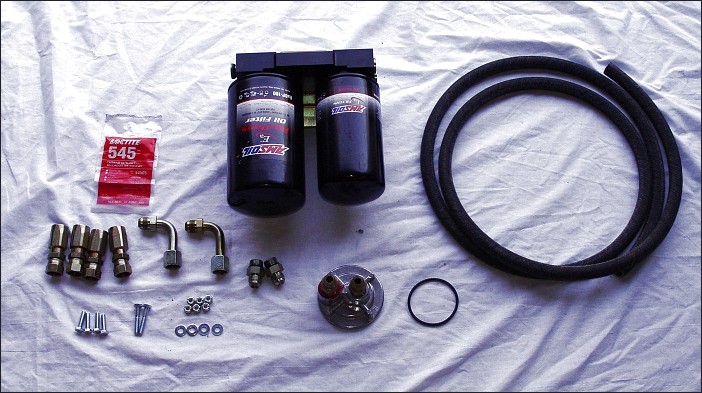 Extend Oil Life & Engine Life Through Better Oil Filtration Amsoil Dual Bypass Oil Filtration By Roger Story Photos & artwork by Roger Story and the manufacturers
Clean oil is a requirement for a long engine life. The cleaner the oil, the longer the engine will last. Oil doesn't wear out, but the additive package is consumed as the miles accumulate and the oil becomes more contaminated. The 6.5 diesel, because of its indirect injected design, tends to contaminate the oil with soot and requires more frequent oil changes. To reduce the frequency of service and to save money on oil changes, extending the oil drain interval through better filtration is making more sense today than ever before. 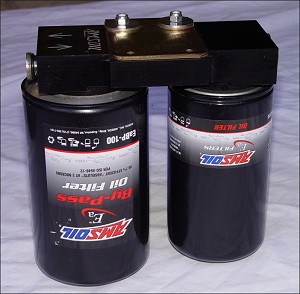
Better filtration can be achieved by way of two methods: You can install a better full-flow oil filter, or install a remote oil filter via one of two methods. The first remote method involves bypass filtration, where a small amount is diverted away from the oiling system, which is filtered through a much finer media (dual by-pass filter system shown on the left). The second remote method, full-flow filtration, where all of the oil is filtered continuously. We'll discuss that method in a moment. When I first made the switch to synthetic motor oil, I chose the first option, a better filter in the stock location. I obtained the oil and filter from Lubrication Specialist. With this, I ran the engine, performing oil analysis along the way. The second analysis was done at 6771 miles through Oil Analyzers, Inc. Results are as follows:
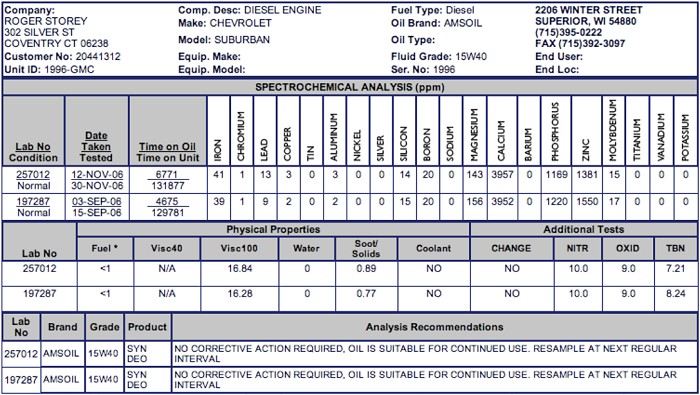 At this point, I was hooked on the convenience of synthetic. It had been 5 months, and I had not changed the oil. So, again with a phone call to Greg Landuyt from Lubrication Specialist, I obtained the full-flow system (BMK-17Ea). This system uses 2 filters that operate in parallel with each other. The full-flow filter (EaO26) is 15 micron, and the bypass filter (EaBP 100) is 2 micron, both are rated to capture particles with a 98.7% efficiency at the corresponding 2 and 15 micron filter rating. This system requires installation, and the mounting location was chosen for ease of maintenance and available space. 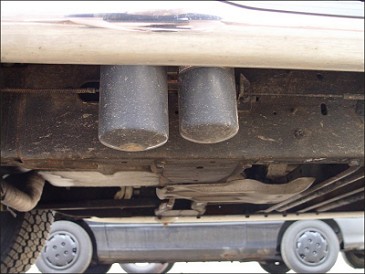 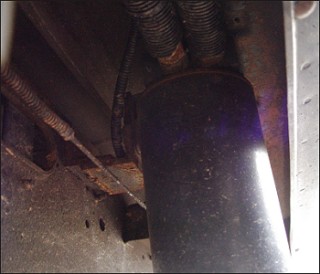 Because of the parking brake cable, a special bracket was fabricated using two pieces of angle iron welded together to form a "C". This allows the bracket to be mounted to the frame, and the remote filter to be mounted to the bracket, while providing adequate clearance for the parking brake cable. 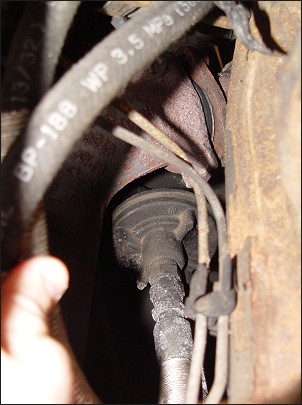
Once the filter mount assembly is mounted, screw the filter adapter onto the engine with each hose connected to the proper port. Run the hose in a way that it avoids the exhaust manifold. I used Thermo-Tec Thermo-Sleeve Insulation (893-14011) from www.Jegs.com, to assist in shielding the hose from the high underhood heat and abrasion. Do not use plastic tubing for chafe/heat protection, as it will melt. Route the hoses back to the Amsoil filter setup, cut to length and install the hose fittings as instructed in the provided instructions. Once the filter head, oil lines and oil filter adapter have been installed, fill the filters with fresh oil and spin them onto the dual-mount head. Drain the old oil from the engine, then refill with synthetic. Start the engine and check for leaks. Oil pressure should build to a normal level after a few seconds of engine operation.
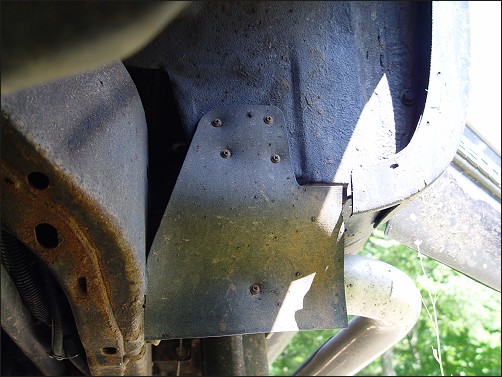
To help protect the oil filters, I fabbed a flap that deflects the mud and road debris.
Since original oil change, the engine has accumulated an additional 12,407 miles with satisfactory results, as follows: 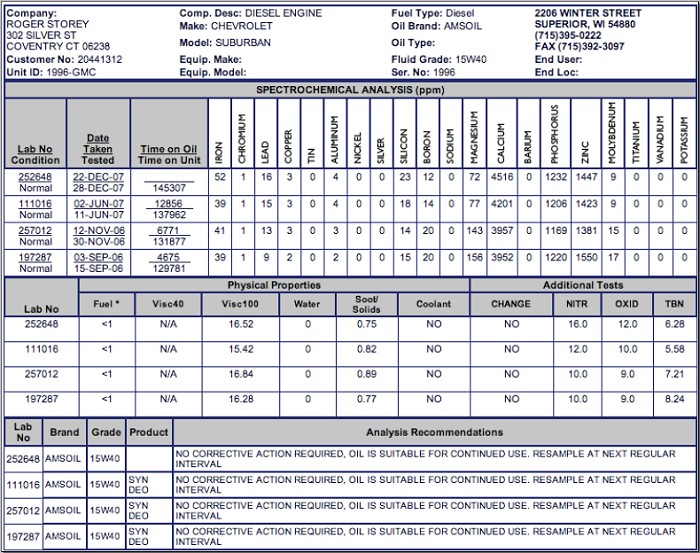 As the results show, there is no fuel in the oil, showing that injectors are not leaking while the engine is shutdown. There is no coolant in the oil, indicating a healthy head gasket and block. 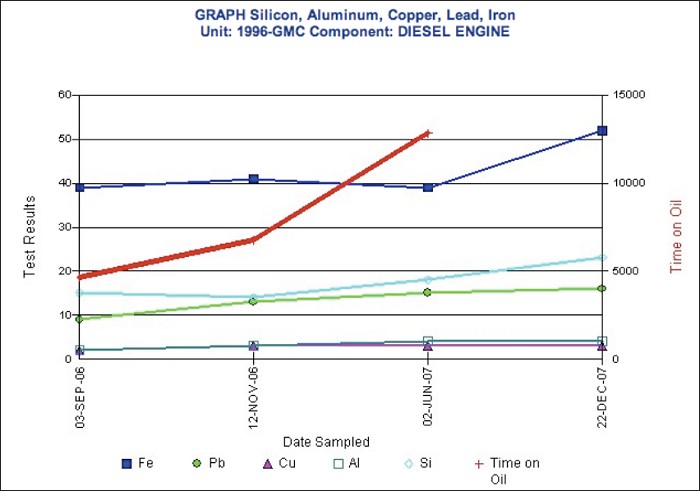 The Included instructions clearly explain how to install the kit, ensuring factory installed quality and first time success. The instructions cover assembly and routing of the hoses, creating the proper bend radiuses, and of course, mounting of the kit components. Installation really is simple. With a 20K change interval, payback time is 50,000 miles. For a 30,000 mile drain interval, the break-even point is 30,000 miles. As of 6/15/2008, the current oil used in my installation has accumulated 27,000 miles. With a properly tuned 6.5 diesel engine (no excessive black smoke), a dual-bypass oil filtration system and synthetic motor oil can extend drain intervals by at least 8 times when compared to conventional oil and filters. For an average of 12,000 miles a year, service intervals are extended to once about every 2 years. With the price of long block replacement engines approaching $10,000, extending engine life has become more important. In addition, longer drain intervals allow you to schedule service when it's more convenient, such as during warmer weather. Filter access is simplified, and filter(s) replacement creates less mess. Ultimately, reducing the number of drain intervals translate to lower operating expenses. With crude oil peaking past $130 a barrel, saving money on vehicle service has become more important that ever. 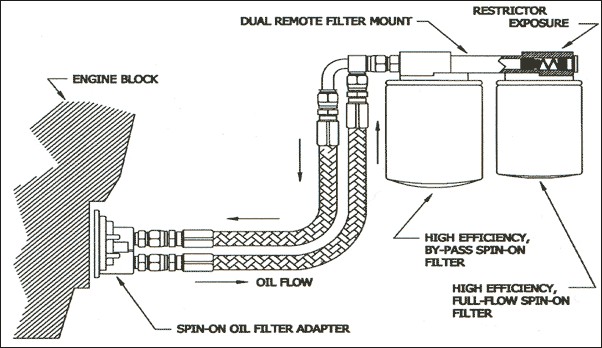
Lubrication Specialist
Oil Analyzers Inc.
Jegs
AMSOIL What's New: | Feature Articles: | Product Reviews: | Member's Area: Join Us: | Duramax Diesel Page: | Advertisers: | Classified Ads: | Books:
Send e-mail to: turbo@TheDieselPage.com |
